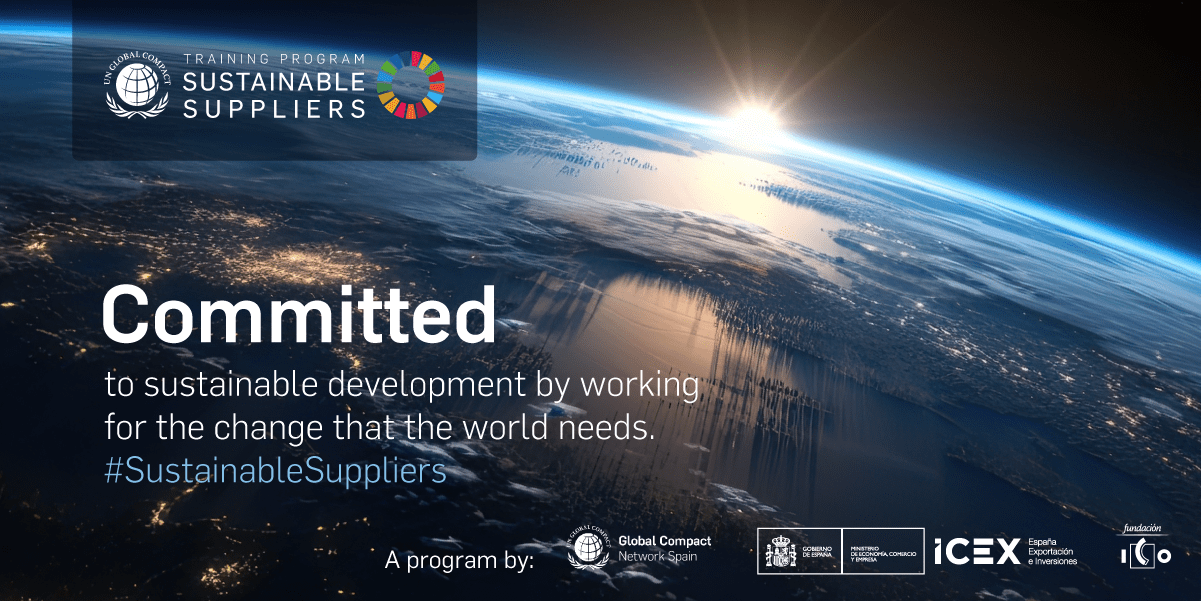Sustainability is no longer an option but a necessity for survival.
The UN Global Compact Spain interviews Barbara Beatrice Lavitola, CEO and founder of BBLTranslation, to showcase the Spanish company as a leader in sustainability and recognise its exceptional performance in the Sustainable Suppliers Training Programme. From nearly 2,000 participating companies, BBLTranslation was selected for its outstanding contributions, a feature highlighted in their report.
Several companies will feature in this report, published in Dirigentes digitales, in order to highlight the importance of the Sustainable Suppliers Training Programme, as well as the crucial role that we SMEs play within the supply chain as agents of change.
- How has participation in the Sustainable Suppliers Programme transformed the way in which BBLTranslation manages its impact?
Since our company joined the UN Global Compact in 2018, we have made a qualitative leap forward thanks to our participation in the training programme. This programme has offered us solid theoretical knowledge and extremely effective practical tools to integrate social responsibility and corporate sustainability principles into our business strategies and in the management of our day-to-day operations. Without a doubt, the biggest takeaway that we’ve gained from this experience has been understanding that we are part of a big common project, of a global objective in which “every action counts”, since this programme, amongst other things, emphasises the significance and great responsibility of all business actors -including SMEs- in order to contribute to the achievement of internationally established sustainability goals. Thanks to our participation in this programme, we have further reinforced the idea that, even though we operate in a sector that is considered “low impact”, there is always room to improve and reduce our footprint further.
Another relevant aspect that the training has provided us with is a definitive understanding that sustainable practices, far from being a passing fad or mere legal compliance, 1) are here to stay; 2) require – in order to be implemented correctly – the involvement of all company divisions; and 3) if well implemented, they enhance the company’s competitiveness and profitability.
By accumulating all of the valuable points that I’ve just briefly summarised, we have greatly strengthened our awareness of how to manage the impact of the orders we receive every day from our clients. More specifically, after having completed the training, we have produced a work plan that performs an “impact analysis”, allowing us to study how to cause the least possible impact when carrying out orders, and implement sustainable and ethical practices that reflect our commitment to our team, the community, and the environment.
- What actions and measures does BBLTranslation take into account and how has it integrated them into its growth and sustainability strategy?
BBLTranslation was the first translation agency in Spain and Italy to offer, from as early as 2017, sworn translations with digital signatures instead of on paper, and this training programme has provided us with an incentive to continue on this path.
In order to continue progressing towards a more sustainable and responsible future, we are committed to generating a positive impact on our business environment, creating value for all stakeholders involved in our processes.
In this sense, we have identified some of the 17 SDGs as priorities for our business strategy. These include those that have a direct impact on our workforce (SDG 3 Good Health and Well-being, SDG 5 Gender Equality and SDG 8 Decent Work and Economic Growth), on our way of working (SDG 9 Industry, Innovation and Infrastructure), on our social environment (SDG 10 Reduced Inequalities and SDG 17 Partnerships for the Goals), and on the environment (SDG 11 Sustainable Cities and Communities, SDG 12 Responsible Production and Consumption and SDG 12 Climate Action).
For BBLTranslation, it is essential that technological advances do not jeopardise the dignity and value of human labour. Therefore, we have reviewed our processes in an effort to balance technological advances with preserving human employment. In this sense, we recommend clients who request translations using AI that they are at least proofread by a human translator, so as to ensure that the quality of text maintains high standards, as well as guaranteeing the continuation of our team’s work. To achieve this, we dedicate adequate time to the budget negotiation phase of each assignment, with the aim of finding a balance between the client’s legitimate demands to reduce costs and our commitment to generating quality jobs that respect labour rights in alignment with the Global Compact’s principles of health and well-being.
Furthermore, in line with Global Compact principles 7, 8 and 9 on environmental sustainability, we have adopted a translation project management tool which not only optimises efficiency, but also minimises the use of resources.
We have trained our staff on how to reduce unnecessary e-mails, communicating everything they want to communicate in a single message, thus avoiding superfluous e-mails, and consequently reducing our carbon footprint.
By the same token, we have developed a company policy that promotes remote working for our staff, with the aim of, on the one hand, facilitating work-life balance and, on the other hand, avoiding having to commute and reducing environmental pollution.
Contrary to the general trend in the market to reduce the number of staff to cut costs, at BBLTranslation, we have opted to keep our entire professional team, negotiating family reconciliation plans with those who need it, which allow professionals to provide their services from anywhere, without compromising the quality of work and the confidentiality that we want to continue to ensure for our clients.
- What additional support do SMEs like BBLTranslation need in order to make faster progress towards implementing a sustainable supply chain?
In this sense, it is crucial for our large corporate clients to share with us their most relevant projects, as well as their future plans with respect to sustainability, so that we, the suppliers, can align ourselves with their objectives and contribute towards them.
This would allow for a win-win situation: we drive sustainability throughout the value chain and supply chain of large companies while enhancing our competitiveness.
Training programmes, such as the UN Global Compact Academy, and Global Compact initiatives are fundamental for us to continue training ourselves and have access to the tools that we need to achieve our sustainability goals and remain part of a sustainable supply chain.





